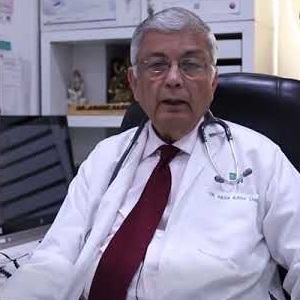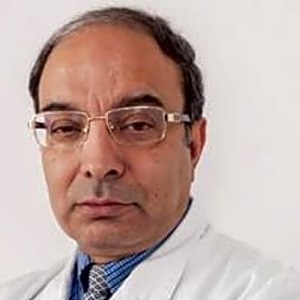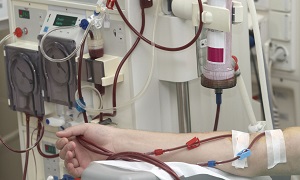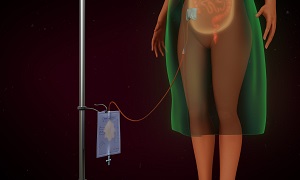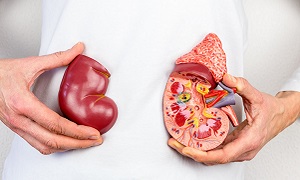Best Doctors in India for Chronic Kidney Disease Treatment
- Nephrologist, Gurugram, India
- Over 25 years’ experience
Profile Highlights:
- Dr. Lakshmi Kant Tripathi throughout his career has supervised around 54000 hemodialyses at different centers in Delhi NCR, with great clinical outcomes.
- He is successfully engaged in kidney transplantations, including Incompatible & High-risk ones. He is a specialist in managing Resistant hypertension, difficult-to-treat Nephrotic Syndromes, Complicated UTIs & high-risk Transplants.
- Nephrologist, Gurugram, India
- Over 40 years’ experience
Profile Highlights:
- Dr. Manju Aggarwal is one of the leading nephrologists in India and has many years of experience in Nephrology at some of the best medical institutions including the University of Minnesota.
- She has expertise in treating critically ill patients with acute and chronic renal failure and those on dialysis and renal transplant.
- Dr. Aggarwal is also experienced in managing difficult and high-risk renal transplants, especially for those who need desensitization.
- Nephrologist, New Delhi, India
- Over 22 years’ experience
Profile Highlights:
- With over 22 years of experience, Dr. Saurabh Pokhriyal is currently associated with Manipal Hospitals in Dwarka, Delhi. Known for his skill in Nephrology and Renal Transplant Medicine, Dr. Saurabh Pokhriyal has a distinct fascination with complex cases of nephrology as well as in performing ABO-contrary transplants.
- He has worked additionally for the Primary treatment of Glomerular Diseases. Dr. Pokhriyal has also authored several articles that have been distributed in different national as well as international chapters and books.
- Nephrologist, New Delhi, India
- Over 45 years’ experience
Profile Highlights:
- Dr. Ashok Sarin is a specialist in Kidney Diseases, Dialysis, and Transplantation. He is currently working at Indraprastha Apollo Hospital, Sarita Vihar, New Delhi.
- After receiving his education at the All India Institute of Medical Sciences, New Delhi, Dr. Ashok Sarin proceeded to Northern Ireland U.K. where he received training under Dr. Mary Mcgeown at the prestigious Belfast City and Royal Victoria Hospital Queens University of Belfast U.K. He is known to receive World Class Training in treating all types of Kidney Diseases, Hemodialysis, CAPD, and Live and Cadaver Kidney Transplantation.
- He is a member of several associations such as the Indian Society of Nephrology, Delhi Nephrology Society, North Zone Society of India, as well as the Association of Physicians of India. He is also the President of the Delhi Nephrology Society.
- Nephrologist, Gurugram, India
- Over 18 years’ experience
Profile Highlights:
- Currently working as Associate Director, Nephrology at Medanta, Gurugram; Dr. Jha has several years of rich experience in his field.
- His area of expertise is renal transplantation, hemodialysis, chronic kidney diseases, and acute kidney injury. Throughout his career, he has treated thousands of patients from all over the country and also provides his patients with the best medical care.
- Dr. Jha completed DNB Nephrology from Manipal Hospital; Bengaluru in 2011. He has wide experience in pre as well as post-transplant care.
- Nephrologist, New Delhi, India
- Over 30 years’ experience
Profile Highlights:
- Dr. Alka Bhasin is a General Physician as well as a Nephrologist and a Renal Specialist, based in Saket, New Delhi. She completed her Fellowship in Nephrology from Thomas Jefferson University Hospital in 2000.
- Some of the services provided by Dr. Alka Bhasin include Hemodiafiltration (HDF), Kidney Transplant, Renal Angioplasty & Stenting, Laparoscopic Nephrectomy, Hemodialysis, etc.
- Nephrologist, Chennai, India
- Over 14 years’ experience
Profile Highlights:
- Dr. Jagdish K is currently designated as the Senior Consultant of Nephrology with a vast experience of 14 years.
- Dr. Jagdish K is well versed in Temporary Haemodialysis Catheters, Bone Marrow Aspiration and Biopsy, Lumbar Puncture, Arterial Lines, and Renal Biopsy.
- His special interests lie in Glomerulonephritis, Extracorporeal treatments, Post-Transplant Infections, and Renal Transplants across blood groups and in highly sensitized individuals.
- Nephrologist, New Delhi, India
- Over 20 years’ experience
Profile Highlights:
- Dr. Rahul Grover is known to be one of the finest renal doctors and nephrologists in New Delhi. He offers excellent care to all his patients.
- He holds an experience of several years and has extensive knowledge in the field of medicine.
- He is also an esteemed member of the Indian Society of Nephrology (ISN), and the Indian Society of Organ Transplantation (ISOT), and this further adds to his credibility.
- Nephrologist, Gurugram, India
- Over 15 years’ experience
Profile Highlights:
- Known as one of the best nephrologists in the NCR region, Dr. Manish Jain holds a special interest in renal transplants as well as clinical nephrology.
- His compassionate patient care and lifestyle advocacy have helped patients recover from various disorders.
- Throughout his career, Dr. Manish Jain has published several papers in India and is also a member of several medical associations.
- Nephrologist, Gurugram, India
- Over 31 years’ experience
Profile Highlights:
- Dr. Vijay Kher is a well-known nephrologist with over 31 years of experience. He did his MBBS from Glancy Medical College, Amritsar. He completed his DNB – General Medicine from the Postgraduate Institute of Medical Education and Research, Chandigarh in 1977.
- Some of the services provided by Dr. Kher are ABO Incompatible Transplantation, Steroid Free Immunosuppression, Clinical Immunosuppression, Kidney Disease Treatment Acute Renal Failure, etc.
Best Hospitals in India for Chronic Kidney Disease Treatment
Fortis Hiranandani Hospital, Mumbai
- City: Mumbai, India
Hospital Highlights:
- Fortis Hiranandani hospital was established in 2007.
- The hospital is an advanced tertiary care, multi-specialty hospital equipped with 149 beds.
- The hospital is equipped with a super ICU to provide emergency medical care to critically ill patients.
- The hospital is NABH accredited.
- The critical care facility in the hospital is augmented with the state-of-the-art facilities that facilitate speedier diagnosis and efficient monitoring.
- The hospital provides specialty medical services in cardiology, orthopedic science, pediatric science, neurology, diabetic care, urology, nephrology, ENT, obstetrics, gynecology, cosmetic surgery, bariatric surgery, neuro and spine care.
Fortis Hospital, Anandpur, Kolkata
- City: Kolkata, India
Hospital Highlights:
- Fortis Hospital, Anandapur, Kolkata is a world-class super-speciality equipped with the latest technologies in the medical world.
- The hospital is NABH accredited.
- This state-of-the-art facility specializes in cardiology and cardiac surgery, urology, nephrology, neurosciences, orthopaedics, digestive care, emergency care and critical care.
- The hospital, governed by integrated Building Management System (IBMS), has a pneumatic chute system, for quick vertical and horizontal transportation between floors, facilitating speedy transfer of patient specimens, documents, reports, and medicines to the concerned departments.
- The hospital also has a nephrology department with over 28 advanced dialysis units.
Fortis Hospital Banerghatta, Bengaluru
- City: Bengaluru, India
Hospital Highlights:
- Fortis Hospital Bannerghatta, Bengaluru was established in 2006.
- The hospital is a 276 bedded multi-specialty tertiary care facility.
- The hospital specializes in cutting-edge medical technology and dedicated patient care services.
- The hospital is equipped with state-of-the-art technologies like trans-radial angioplasty, trans-abdominal cardiac surgery, and computerized TKR navigation surgery.
- The hospital provides specialty medical services in cardiology, cardiac surgery, orthopedics, neurology, neuro-surgery, GI, and Minimal Access Surgery (MAS).
Fortis Hospital, Malar, Chennai
- City: Chennai, India
Hospital Highlights:
- Fortis Malar was established in 1992 and was formerly known as Malar Hospital.
- The hospital specializes in cutting-edge medical technology and dedicated patient care services.
- The hospital is multi-specialty, tertiary care facility with 180 beds.
- The hospital offers comprehensive medical care in specialties such as cardiology, cardio-thoracic surgery, neurology, neurosurgery, orthopedics, nephrology, gynecology, gastroenterology, urology, pediatrics, and diabetes.
Gleneagles Global Hospital, Parel, Mumbai
- City: Mumbai, India
Hospital Highlights:
- Gleneagles Global Hospital The 450-bed facility comprises of 17-stories, housing state-of-the-art infrastructure, and advanced medical care facilities.
- The hospital offers end-to-end clinical, surgical, and diagnostic services. It is equipped with a team of eminent medical professionals aided by qualified nurses and medical staff
- The Hospital offers advanced Endoscopic procedures, Hepatobiliary and Liver Surgeries, Surgical and Medical Gastroenterology, Bariatric Surgery, and Robotic surgery.
- The hospital is a center of excellence for Orthopedics, Joint Replacement, Knee Replacement, and Hip Replacement surgery.
Manipal Hospital, Dwarka, Delhi
- City: New Delhi, India
Hospital Highlights:
- Manipal Hospitals, Dwarka, is a super-specialty hospital in Dwarka, New Delhi, which is a part of Manipal Hospitals Group.
- The hospital aims to provide the best treatment on par with international standards at a fraction of the cost.
- Equipped with 380 beds, the hospital is also one of the new age hospitals which are equipped fully with state-of-the-art infrastructure, cutting-edge technology as well as the latest and advanced clinical practices. The hospital also has 13 modular Operation theatres with 118 beds which are solely meant for critical care.
- The hospital comprises internationally acclaimed doctors and highly professional and experienced hospital and medical staff who are able to provide preventive, therapeutic, and diagnostic services all under one roof.
Paras Hospital, Gurugram
- City: Gurugram, India
Hospital Highlights:
- Paras hospital was established in 2006 and is the 250 bedded flagship hospital of Paras Healthcare.
- The is supported by a team of doctors of international and national repute.
- The hospital is NABH accredited and also the first hospital in the region to have a NABL accredited laboratory.
- The hospital provides specialty medical services in around 55 departments including Neurosciences, Joint Replacement, Mother & Child Care, Minimal Invasive Surgery, Gynecology and Obstetrics, Ophthalmology, Dermatology, Endocrinology, Rheumatology, Cosmetic and Plastic surgery.
- The hospital is equipped with state-of-the-art technologies.
S L Raheja Hospital, Mahim, Mumbai
- City: Mumbai, India
Hospital Highlights:
- SL Raheja hospital is a 140-bed multi-specialty tertiary care hospital that is being managed by Fortis Healthcare Ltd.
- The hospital is a benchmark in healthcare and medical facilities in the neighborhood of Mahim & the western suburbs.
- L.Raheja Hospital, Mahim has one of the most effective ICU and Casualty care services.
- The hospital provides specialty medical services in Cardiology, Oncology, Neurology, Orthopedics, Mother & Child Care, and in Diabetes.
Wockhardt Hospitals, Mumbai
- City: Mumbai, India
Hospital Highlights:
- Wockhardt Hospitals were established in the year 1973, originally called First Hospitals and Heart Institute.
- Wockhardt Hospitals are super specialty health care networks in India, nurtured by Wockhardt Ltd, India’s 5th largest Pharmaceutical and Healthcare company.
- Wockhardt Hospitals is associated with Partners Harvard Medical International, an international arm of Harvard Medical School, USA.
- Wockhardt Heart Hospital performed India’s first endoscopic heart surgery.
- The hospital has a state-of-the-art infrastructure equipped with the latest technologies and modern equipment.
- It has special Centers of Excellence dedicated to the major specialties to provide hassle-free and high-quality clinical care.
Pushpawati Singhania Hospital & Research Institute, New Delhi
- City: New Delhi, India
Hospital Highlights:
- Established in 1996, Pushpawati Singhania Research Institute is one of the top hospitals in the NCR region, as well as one of the top facilities in India for gastroenterology. The hospital is one of South Asia’s first institutes in medical and surgical treatment for diseases related to digestion.
- The hospital is equipped with state-of-the art facilities coupled with the latest equipment as well as renowned consultants from various parts of India as well as other parts of the world.
Chronic Kidney Disease
Chronic kidney disease is a slow and progressive loss of kidney function over several years, in which the person eventually develops permanent kidney failure.
Also known as chronic renal failure, chronic kidney disease, is more widespread than people think, since it mostly goes undetected, and undiagnosed until the disease is at an advanced stage. Sometimes, it is even discovered when the function of the kidneys is down to 25 percent of normal. As this condition advances, the function gets impaired severely, and dangerous levels of fluid and waste can build up in the body rapidly. Treatment is therefore aimed at slowing down or stopping the progression of the disease, and this is often done by controlling the underlying cause.
Symptoms
If kidney damage progresses, then signs and symptoms of chronic kidney disease develops over time slowly. Some of the signs and symptoms include:
- Nausea
- Fatigue and weakness
- Vomiting
- Changes in how much you urinate
- Loss of appetite
- Sleep problems
- Decreased mental sharpness
- Muscle twitches and cramps
- Swelling of feet and ankles
- Persistent itching
- High blood pressure that becomes difficult to control
- Chest pain, if there is a build-up of fluid, around the lining of the heart
- Shortness of breath, if fluid builds up in the lungs
Sometimes signs and symptoms of kidney disease might be nonspecific, which means that they may be caused by other illnesses as well. The kidneys are highly adaptable and are also able to compensate for lost function, and therefore signs and symptoms might not appear until irreversible damage has occurred. If you see these signs and symptoms, then make an appointment with your doctor.
Causes & risk factors
Diabetes and high blood pressure are considered to be the most two common causes of chronic kidney disease. They are generally responsible for over two-thirds of the cases.
Diabetes occurs when your blood sugar is too high and causes damage to various organs in your body, which includes the kidneys, heart as well as blood vessels.
High blood pressure, also known as hypertension occurs when the pressure of your blood against the walls of your blood vessels increases. If it is not controlled properly, it can lead to strokes, heart attacks, or chronic kidney disease. Chronic kidney disease can also be a cause of high blood pressure. Some other conditions are also there, which might lead to kidney disease, some of them including:
- Glomerulonephritis, a group of diseases that causes inflammation and damage to the filtering units of the kidneys. These disorders are known to be the third common type of chronic kidney disease.
- There are also inherited diseases, such as polycystic kidney disease, which can cause large cysts to form in the kidneys and damage the surrounding tissue.
- Malformations can also occur as a baby develops in its mother’s womb. For example, there might be a narrowing that prevents the normal outflow of urine and causes it to flow back up to the kidney. This can lead to infections and might even damage the kidneys.
- Obstructions which are caused by problems like kidney stones, tumors, or an enlarged prostate gland in men
- Lupus and other diseases that affect the immune system of the body
- Repeated urinary infections.
The list of risk factors that can increase your risk of developing chronic kidney disease include:
- Diabetes
- High blood pressure
- Heart and blood vessel (cardiovascular) disease
- Obesity
- Smoking
- Family history of kidney disease
- Having an abnormal kidney structure
- Older age
People of African-American, Native-American, or Asian-American ethnicity are generally more likely to have this condition.
Diagnosis
First, your doctor is going to discuss your personal and family history with you, and might also ask questions about whether you have been diagnosed with high blood pressure, or if you have taken any medicine that can affect the function of the kidneys. He/she will also likely ask if you have any family members having kidney disease and if you have seen any changes in your urinary habits.
Next, your doctor will need to perform a physical exam, and check for signs of problems with your heart or blood vessels, and will also conduct a neurological exam.
Some other tests and procedures might also be required, which include blood tests, imaging tests, urine tests, and a kidney biopsy.
Treatment
Medications
Although there is no current cure for chronic kidney disease, there are some therapies that can help control the signs and symptoms, as well as reduce the risk of complications.
Patients suffering from chronic kidney disease generally need to take a large number of medications, and different kinds of treatments. Some of these include:
Anemia Treatment– Hemoglobin is the substance in red blood cells that carry vital oxygen around your body. When this hemoglobin becomes low, the patient is known to have anemia. Therefore, some kidney patients might require blood transfusions. A patient with kidney disease might also require iron supplements, either in the form of daily ferrous sulfate tablets or in the form of injections.
Skin itching- Patients with chronic kidney disease can also suffer from skin itching problems. In such cases, Antihistamines, like chlorphenamine, can help in alleviating symptoms of itching.
Phosphate Balance– People having kidney disease might also not be able to eliminate phosphate properly from their bodies. If this occurs, patients are generally advised to reduce their nutritional phosphate intake, which means reducing the consumption of red meat, fish, eggs as well as dairy products.
High Blood Pressure- A common problem among patients with chronic kidney disease is high blood pressure. It is important to bring it down to protect the kidneys, in order to slow down the progression of the disease.
Anti-Sickness Medications– If toxins build up in the body, because of the kidneys not working properly, patients might feel sick. Therefore anti-sickness medications can help to relieve this sickness.
End-Stage Treatment
End-stage treatment is required when the kidneys are functioning at less than 10-15 percent of normal capacity, and measures such as diet, medications, and treatments are no longer able to manage the condition. Dialysis or kidney transplant is needed to survive.
Doctors generally try to delay the need for dialysis or kidney transplant, as long as they can, because they carry the risk of serious complications.
Kidney Dialysis
Kidney dialysis can be of several types. The two main types include the following-
Hemodialysis
Hemodialysis involves blood being pumped out of the body of the patient, and it goes through an artificial kidney which is called a dialyzer. The patient undergoes hemodialysis three times per week, and each session lasts for at least three hours.
According to experts, more frequent sessions generally result in a better quality of life for the patient, and with modern home-use dialysis machines, this is becoming more possible.
Peritoneal dialysis
In peritoneal dialysis, the blood is filtered in the own abdomen of the patient, in the peritoneal cavity, which contains a vast network of tiny blood vessels. A catheter is implanted into the abdomen, into which a dialysis solution is infused and drained out for as long as needed to remove the wastage and excess fluid.
Kidney Transplant
Complications
Almost every part of your body can get affected by chronic kidney disease, and some of the potential complications include:
- Fluid retention, which may lead to swelling in your arms and legs, or even high blood pressure, or fluid in your lungs, which is termed as pulmonary edema
- A sudden rise in the potassium levels in your blood, i.e. hyperkalemia. This can even impair your heart’s ability to function and might be even life-threatening
- Weak bones which can lead to an increased risk of bone fractures
- Heart and blood vessel (cardiovascular) disease
- Decreased sex drive, reduced fertility or erectile dysfunction
- Anemia
- Damage to the central nervous system, which can cause problems in concentrating, and might even lead to personality changes or seizures
- Pericarditis, an inflammation of the saclike membrane that envelops your heart
- Decreased immune response, which can make you more vulnerable to infection
- Pregnancy complications that carry risks for both the mother as well as the developing fetus
- Irreversible damage to both kidneys, which is known as end-stage kidney disease. This can require dialysis or even a kidney transplant
Prevention
Generally, diabetes and high blood pressure are the most common causes of chronic kidney disease. If you are having diabetes or high blood pressure, work with your doctor, and make efforts to keep it in control, to prevent kidney ailment.
Living a healthy lifestyle helps to prevent diabetes, high blood pressure, and kidney disease. You may follow these tips for lowering the risk of kidney disease, as well as the problems that cause it.
- Follow a low-salt and low-fat diet
- Have check-ups regularly with your doctor
- Exercise for a minimum of 30 minutes for at least five days a week
- Limit the use of alcohol
- Avoid smoking or tobacco use




